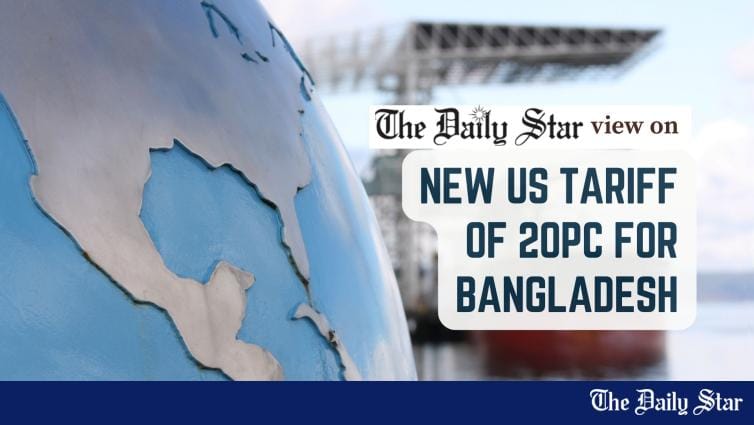Saif
Senior Member
- Joined
- Jan 24, 2024
- Messages
- 16,529
- Likes
- 8,140
- Nation

- Residence

- Axis Group


Commerce Advisor Sk Bashir proved his mettle: Energy Adviser
Commerce Advisor Sk Bashir Uddin proved his mettle over successful US tariff negotiations, Energy Adviser Fouzul Kabir Khan said on Friday.
Commerce Advisor Sk Bashir proved his mettle: Energy Adviser
Staff Correspondent Dhaka
Updated: 01 Aug 2025, 18: 12

Advisers Muhammad Fouzul Kabir (L) and Sk Bashiruddin
Commerce Advisor Sk Bashir Uddin has proved his mettle over successful tariff negotiations with the US, Adviser to the Ministry of Power Energy and Mineral Resources Muhammad Fouzul Kabir Khan said on Friday.
In a Facebook post of Friday afternoon, Fouzul Kabir said, “From domestic price stability to successful tariff negotiations with the US, he (Sk Bashir Unddin) has proved his mettle, to the dismay of naysayers.”
He called Sk Bashir Uddin as ”our extraordinary Commerce Advisor.”
Fouzul Kabir said, “I was tasked by the CA (Chief Adviser) to meet Sheikh Bashiruddin, among others, for the possible position of Commerce Advisor. I caught him on phone in Bhola, where he was on a business trip. We met at my office at the Ministry of Power Energy and Mineral Resources.
“Without any previous acquaintance, we chatted for an hour. He politely declined the snacks my office offered him! What I liked about him is his patriotism, no-nonsense stubbornness, and clarity in organizing a mass of facts for analysis. I conveyed my impressions about him to the CA. Thankfully, for our nation, the CA offered and he accepted the position,” he added.
“May Allah give him Hayate Taiyeba to serve the nation, be it in the public or private sector,” Fouzul Kabir concluded.
On 2 April, US President Donald Trump imposed reciprocal tariffs on countries from which the US imports goods. Fifty seven countries were slapped with increased tariffs at varying rates with Bangladesh facing an additional tariff of 37 per cent.

Muhammad Fouzul Kabir Khan
After a three-month suspension of this decision, President Trump informed the Chief Adviser of the interim government in a letter on 8 July that the reciprocal tariff for Bangladesh would be 35 per cent, effective from 1 August.
To reduce the reciprocal tariff imposed by the US administration, Commerce Advisor Sk Bashir Uddin led final negotiations in Washington with officials from the Office of the United States Trade Representative (USTR).
Finally, President Donald Trump issued an executive order on Thursday (US local time), imposing a 20 per cent reciprocal tariff on goods imported from Bangladesh. In the same order, he imposed reciprocal tariffs on several dozen other countries as well.
Staff Correspondent Dhaka
Updated: 01 Aug 2025, 18: 12
Advisers Muhammad Fouzul Kabir (L) and Sk Bashiruddin
Commerce Advisor Sk Bashir Uddin has proved his mettle over successful tariff negotiations with the US, Adviser to the Ministry of Power Energy and Mineral Resources Muhammad Fouzul Kabir Khan said on Friday.
In a Facebook post of Friday afternoon, Fouzul Kabir said, “From domestic price stability to successful tariff negotiations with the US, he (Sk Bashir Unddin) has proved his mettle, to the dismay of naysayers.”
He called Sk Bashir Uddin as ”our extraordinary Commerce Advisor.”
Fouzul Kabir said, “I was tasked by the CA (Chief Adviser) to meet Sheikh Bashiruddin, among others, for the possible position of Commerce Advisor. I caught him on phone in Bhola, where he was on a business trip. We met at my office at the Ministry of Power Energy and Mineral Resources.
“Without any previous acquaintance, we chatted for an hour. He politely declined the snacks my office offered him! What I liked about him is his patriotism, no-nonsense stubbornness, and clarity in organizing a mass of facts for analysis. I conveyed my impressions about him to the CA. Thankfully, for our nation, the CA offered and he accepted the position,” he added.
“May Allah give him Hayate Taiyeba to serve the nation, be it in the public or private sector,” Fouzul Kabir concluded.
On 2 April, US President Donald Trump imposed reciprocal tariffs on countries from which the US imports goods. Fifty seven countries were slapped with increased tariffs at varying rates with Bangladesh facing an additional tariff of 37 per cent.
Muhammad Fouzul Kabir Khan
After a three-month suspension of this decision, President Trump informed the Chief Adviser of the interim government in a letter on 8 July that the reciprocal tariff for Bangladesh would be 35 per cent, effective from 1 August.
To reduce the reciprocal tariff imposed by the US administration, Commerce Advisor Sk Bashir Uddin led final negotiations in Washington with officials from the Office of the United States Trade Representative (USTR).
Finally, President Donald Trump issued an executive order on Thursday (US local time), imposing a 20 per cent reciprocal tariff on goods imported from Bangladesh. In the same order, he imposed reciprocal tariffs on several dozen other countries as well.






































